THE IN CROWD : New Immigration Laws generate mixed reactions : A Well Thought Out Scream by James Riordan
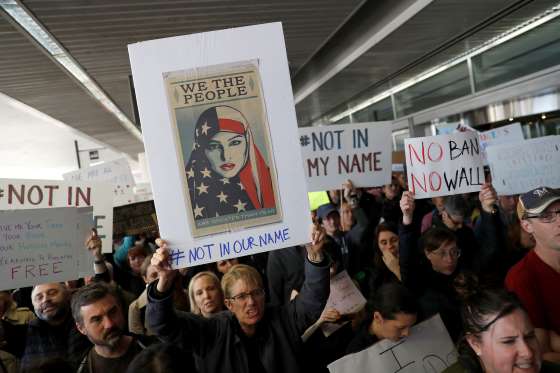
Everything always sounds easier from the speaker platform. If you go back to the 1930s and listen to the popular speeches of the day, many were promoting Eugenics. The main speech at the 1935 American Psychiatric Association Conference held in Chicago was by Alexis Carrel. Carrel, won the Nobel Prize in Medicine in 1912 for pioneering vascular suturing techniques. He invented the first perfusion pump with Charles A. Lindbergh which allows living organs to exist outside the body during surgery. He helped develop the Carrel–Dakin method of treating wounds based on chlorine. For this, Carrel was awarded the Légion d’honneur.
Part of the speech was as follows.
“Today, I would like to speak to you about the greatest adventure of them all. The extension of human life and the betterment of the human race. Giant sums are now required to maintain prison and insane asylums and protect the public against gangsters and lunatics. Why do we preserve these useless and harmful beings? The abnormal prevent the development of the normal! This fact must be squarely faced. Why should society not dispose of the criminals and the insane in a more economical manner? The community must be protected against troublesome and dangerous elements. How can this be done? They should be humanely and economically disposed of in small euthanasic institutions supplied with proper gases…If that seems too harsh for you, than at the very least these people should be sterilized to prevent their continued propagation.”
The very popular Charles Lindbergh was also a proponent of Eugenics. It all sounded good and seemed to make sense from the speaker platform. Then Adolph Hitler came along and actually did it. While he is infamous for the execution of six million Jews, Hitler also put into practice everything that intellectuals like Carrel and Lindbergh were advocating. Now, history looks back with absolute horror at Hitler’s execution and sterilization of the insane, the sexually deviant by his standards including homosexuals and the feeble minded. It was horrific, but some of it sounded so good in principle.
Today, we are faced with new rhetoric, new radical solutions for America’s problems and it all sounded pretty good from the speaker platform. But, now comes the hard part – the putting of theory into practice. Something has to be done about terrorism. One solution is to not allow anyone from terrorist strongholds to come to America. Of course, in order to keep out the violent and dangerous 5% from doing harm in America, we are also keeping out the 95% who are innocent and wish to be free of the madness that surrounds them by moving to America. Many of us might say that the injustice done to the 95% is a form of collateral damage and I think I agree with that view. But that doesn’t mean we don’t need to be careful about how far this kind of thinking can go.
Over the last decade, Christians in the United States have grown increasingly alarmed about the persecution of other Christians overseas, especially in the Middle East. With each priest kidnapped in Syria, each Christian family attacked in Iraq or each Coptic church bombed in Egypt, the clamor for action rose. During the campaign, President Trump picked up on these fears, speaking frequently of Christians who were refused entry to the United States and beheaded by terrorists of the Islamic State: “If you’re a Christian, you have no chance,” he said in Ohio in November.
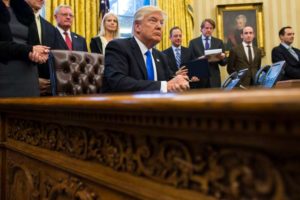 Now President Trump has followed through on his campaign promise to rescue Christians who are suffering. The executive order he signed on Friday gives preference to refugees who belong to a religious minority in their country, and have been persecuted for their religion. The president detailed his intentions during an interview with the Christian Broadcasting Network on Friday, saying his administration is giving priority to Christians because they had suffered “more so” than others, “so we are going to help them.”
Now President Trump has followed through on his campaign promise to rescue Christians who are suffering. The executive order he signed on Friday gives preference to refugees who belong to a religious minority in their country, and have been persecuted for their religion. The president detailed his intentions during an interview with the Christian Broadcasting Network on Friday, saying his administration is giving priority to Christians because they had suffered “more so” than others, “so we are going to help them.”
In the past few days many Christian leaders have strongly denounced this order as discriminatory, misguided and inhumane. Outrage has also come from some of the evangelical, Roman Catholic and mainstream Protestant leaders who represent the churches most active in trying to aid persecuted Christians.
By giving preference to Christians over Muslims, religious leaders have said the executive order pits one faith against another. By barring any refugees from entering the United States for nearly four months, it leaves people to suffer longer in camps, and prevents families from reuniting. Also, many religious leaders have said that putting an indefinite freeze on refugees from Syria, and cutting the total number of refugees admitted this year by 60,000, shuts the door to those most in need.
“We believe in assisting all, regardless of their religious beliefs,” said Bishop Joe S. Vásquez, the chairman of the committee on migration for the United States Conference of Catholic Bishops.
Jen Smyers, the director of policy and advocacy for the immigration and refugee program of Church World Service, a ministry affiliated with dozens of Christian denominations, called Friday a “shameful day” in America’s history.
It remains to be seen whether President Trump’s executive order will find more support in the pews. During the campaign, Mr. Trump successfully mined many voters’ concern about national security and fear of Muslims. He earned the votes of four out of every five white evangelical Christians, and a majority of white Catholics, exit polls showed.
© Kevin D. Liles for The New York Times The Rev. Franklin Graham speaking in Atlanta in 2016. He called for a ban on Muslims entering the United States months before President Trump did the same as a candidate.
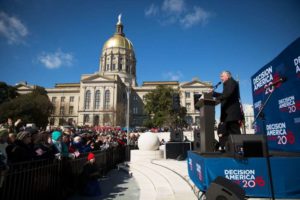 There are also a few Christian leaders who defended Trump’s executive order. One of the few was the Rev. Franklin Graham, the son of the evangelist Billy Graham and the president of Samaritan’s Purse, an evangelical aid organization. Mr. Graham has long denounced Islam as “evil,” and in July 2015 proposed a ban on Muslims entering the United States as a solution to domestic terrorism, months before Mr. Trump made his first call for the same. In a statement on Saturday, Mr. Graham said of refugees: “We need to be sure their philosophies related to freedom and liberty are in line with ours.” He added that those who follow Sharia law — a set of beliefs at the core of Islam — hold notions “ultimately incompatible with the Constitution of this nation.”
There are also a few Christian leaders who defended Trump’s executive order. One of the few was the Rev. Franklin Graham, the son of the evangelist Billy Graham and the president of Samaritan’s Purse, an evangelical aid organization. Mr. Graham has long denounced Islam as “evil,” and in July 2015 proposed a ban on Muslims entering the United States as a solution to domestic terrorism, months before Mr. Trump made his first call for the same. In a statement on Saturday, Mr. Graham said of refugees: “We need to be sure their philosophies related to freedom and liberty are in line with ours.” He added that those who follow Sharia law — a set of beliefs at the core of Islam — hold notions “ultimately incompatible with the Constitution of this nation.”
Jim Jacobson, the president of Christian Freedom International, which advocates for persecuted Christians, applauded the executive order and said: “The Trump administration has given hope to persecuted Christians that their cases will finally be considered.”
In Canada, Prime Minister Justin Trudeau welcomed those fleeing war and persecution on Saturday even as Canadian airlines said they would turn back U.S.-bound passengers to comply with an immigration ban on people from seven Muslim-majority countries. A day after President Donald Trump put a four-month hold on allowing refugees into the United States and temporarily barred travelers from the seven countries, Trudeau said in a tweet: “To those fleeing persecution, terror & war, Canadians will welcome you, regardless of your faith. Diversity is our strength #WelcomeToCanada.” As long as they can play hockey (okay, that part wasn’t in Trudeau’s statement).
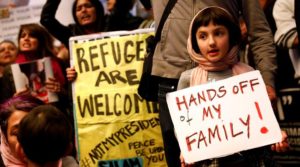
Confusion abounded at airports around the world on Saturday as immigration and customs officials struggled to interpret the new U.S. rules. While Trudeau was tweeting a welcome to refugees, others on the social media platform were questioning whether Immigration Minister Ahmed Hussen — a Somali-Canadian refugee — would be able to travel to the United States under the new rules. In Canada, WestJet Airlines said it turned back a passenger bound for the United States on Saturday to comply with an executive order signed by Trump on Friday. WestJet spokeswoman Lauren Stewart said the airline would give full refunds to anyone affected by the order. It did not say which country the passenger had come from. The order would help protect Americans from terrorist attacks, the president said. Stewart said WestJet had been informed by U.S. Customs and Border Patrol (CBP) that the ban did not apply to dual citizens who had passports from countries other than those covered by the ban: Iran, Iraq, Libya, Somalia, Sudan, Syria and Yemen. “U.S. CBP has confirmed it is the citizenship document they present to enter the country, not the country of where they were born,” Stewart wrote in an email.
In Vancouver, an employee at the American Airlines counter said one person traveling on an Iranian passport had been turned away Saturday morning. Air Canada, the country’s other major airline, said it was complying with the order but did not comment on whether it had yet denied travel to any passengers. “We are required to ensure passengers have the required documents for entry into, or transit the countries they are traveling to,” said spokeswoman Isabelle Arthur. “In the case of these nationalities, they are not permitted to enter the U.S.”
A spokesman for Porter Airlines said the Toronto-based carrier will be restricting passengers from traveling to the United States from the listed countries until further notice. Porter will waive fees for changing destinations and offer refunds for canceled trips related to the advisory.
A federal judge in Brooklyn came to the aid of scores of refugees and others who were trapped at airports across the United States on Saturday after an executive order signed by President Trump, which sought to keep many foreigners from entering the country, led to chaotic scenes across the globe. The judge’s ruling blocked part of the president’s actions, preventing the government from deporting some arrivals who found themselves ensnared by the presidential order. But it stopped short of letting them into the country or issuing a broader ruling on the constitutionality of Mr. Trump’s actions. The high-stakes legal case played out on Saturday amid global turmoil, as the executive order signed by the president slammed shut the borders of the United States for an Iranian scientist headed to a lab in Massachusetts, a Syrian refugee family headed to a new life in Ohio and countless others across the world. The president’s order, enacted with the stroke of a pen at 4:42 p.m. Friday, suspended entry of all refugees to the United States for 120 days, barred Syrian refugees indefinitely, and blocked entry into the United States for 90 days for citizens of seven predominantly Muslim countries: Iran, Iraq, Libya, Somalia, Sudan, Syria and Yemen.
These are desperate times which often require desperate measures. So far, so good, but it is our best interest and in the best interest of the world that we keep one eye wide open.
___


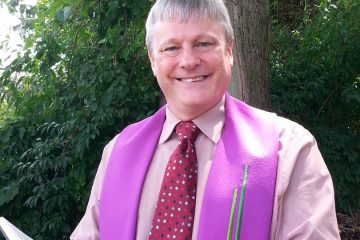



No Comment